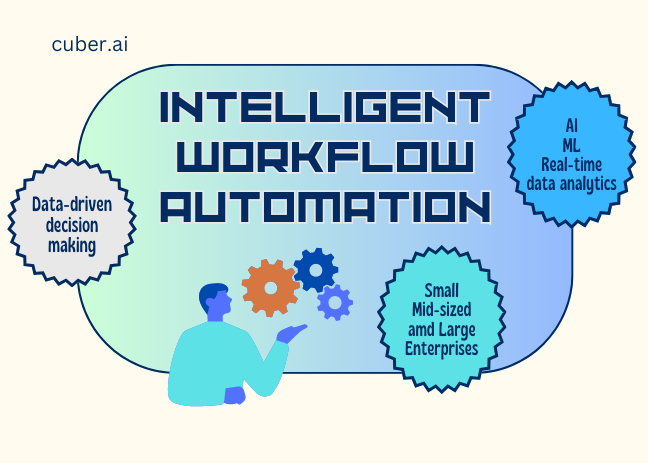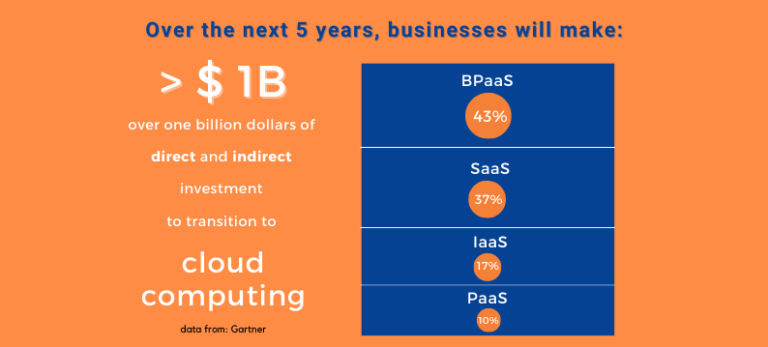Introduction
In the era of digital transformation, businesses across the globe are turning to automation solutions to streamline operations, enhance efficiency, and drive innovation. At the heart of this revolution is intelligent workflow automation, a technology that merges the precision of automation with the ingenuity of AI to facilitate data-driven action and AI-driven operational efficiency.
This integration not only optimizes business processes but also lays the foundation for a more adaptive, responsive, and competitive enterprise landscape. Through intelligent workflow automation, companies can unlock the full potential of digital employee experience automation, AI service management solutions, and cognitive automation services, marking a significant leap towards operational excellence and strategic agility.
As we delve into the intricacies of intelligent workflow automation, it becomes evident that its application transcends basic automation; it is about redefining the digital backbone of businesses, ensuring that every process, from the mundane to the complex, is infused with intelligence, efficiency, and scalability.
This blog aims to unpack the transformative power of intelligent workflow automation, exploring its impact, technologies, and best practices for implementation, thereby providing a roadmap for businesses looking to leverage AI-powered business process optimization for sustainable growth and competitive advantage.
The Evolution of Automation in Business
Tracing the trajectory of automation in the business sector unveils a fascinating evolution from rudimentary mechanical aids to sophisticated AI-driven operational efficiency systems. Initially, automation solutions for businesses were designed to tackle repetitive tasks, reducing human error and freeing up time for strategic endeavors.
However, as technology advanced, the advent of intelligent workflow automation heralded a new era of business process automation AI. This shift towards data-driven automation services brought about a paradigm where not just tasks, but entire processes and decision-making workflows could be automated, courtesy of cognitive automation services and AI service management solutions.
Today, enterprise automation platforms stand as the pillars of modern businesses, driving digital transformation through automation and propelling organizations towards unprecedented levels of efficiency and productivity.
By integrating AI-powered business process optimization into their core operations, companies are not just automating for efficiency’s sake but are reimagining what is possible in a digitally transformed business landscape.
This historical perspective sets the stage for a deeper exploration of intelligent workflow automation, illustrating its pivotal role in the journey from traditional automation to a future where enterprises operate at the zenith of efficiency, powered by AI and data-driven insights.
Understanding Intelligent Workflow Automation
Intelligent workflow automation emerges as a beacon of innovation in the realm of business process automation, offering a seamless blend of AI-driven operational efficiency and data-driven automation services. This sophisticated form of automation transcends conventional boundaries, leveraging enterprise automation platforms, cognitive automation services, and AI service management solutions to orchestrate complex workflows with unparalleled precision.

At its core, intelligent workflow automation is not merely about automating tasks; it’s about enriching them with intelligence—enabling systems to learn from data, adapt to new information, and make informed decisions in real-time. This capability transforms digital employee experience automation, empowering businesses to optimize operations dynamically, respond to challenges proactively, and drive continuous improvement across all facets of their organization.
By implementing intelligent workflow automation, companies can unlock the full spectrum of benefits offered by AI-powered business process optimization, from enhanced productivity and reduced operational costs to improved customer satisfaction and strategic agility. As we delve into the mechanics of intelligent workflow automation, it becomes clear that its true value lies in its ability to fuse data, technology, and human insight into a cohesive, intelligent system that propels businesses towards their operational and strategic goals.
Key Technologies Driving Intelligent Workflows
The advancement of intelligent workflow automation is propelled by a suite of pioneering technologies, each playing a crucial role in enabling businesses to achieve AI-driven operational efficiency and data-driven automation services. At the forefront are AI service management solutions, which streamline IT and service processes through automation and AI, enhancing responsiveness and reducing downtimes.
Similarly, cognitive automation services utilize AI technologies like machine learning and natural language processing to interpret complex data, automate decision-making processes, and offer predictive insights, fundamentally transforming business process automation AI.
Moreover, enterprise automation platforms serve as the backbone of intelligent workflow automation, providing the infrastructure necessary for deploying and managing a wide array of automation solutions.
These platforms offer a unified environment where AI-powered business process optimization can flourish, enabling seamless integration of various automation technologies and ensuring that businesses can adapt and scale their automation strategies as needed.
In addition, the emergence of digital employee experience automation and intelligent virtual assistant for enterprises underscores the shift towards creating more intuitive and efficient workplace environments. These technologies not only improve operational workflows but also enhance employee satisfaction and productivity by automating routine tasks and providing instant access to information and support.
Together, these key technologies form the foundation of intelligent workflow automation, enabling organizations to harness the power of AI and data to streamline operations, improve decision-making, and drive digital transformation.
As businesses continue to navigate the complexities of the digital age, the adoption of these technologies becomes increasingly critical, offering a path to enhanced efficiency, agility, and competitive advantage.
The Role of Data in Automation
In the realm of intelligent workflow automation, data acts as the cornerstone, enabling businesses to unlock the full potential of AI-driven operational efficiency. Data-driven automation services leverage the vast amounts of information generated by businesses to fuel AI algorithms, providing the insights necessary for making informed decisions and optimizing business processes.

This reliance on data transforms the approach to business process automation AI, shifting from rule-based automation to dynamic, intelligent systems capable of adapting to new data in real-time.
Implementing data-driven action for business efficiency involves harnessing data from various sources, including customer interactions, operational metrics, and market trends, to inform and guide automation strategies. This approach ensures that automation efforts are not only efficient but also aligned with business objectives and market demands.
Furthermore, the integration of cognitive automation services and enterprise automation platforms enables businesses to process and analyze data at unprecedented scales, uncovering patterns and insights that would be impossible for human analysts to identify. This capability is critical for optimizing AI-powered business process optimization, allowing companies to continuously refine and improve their operations based on actionable data insights.

By prioritizing data-driven automation, businesses can achieve a level of operational agility and efficiency that sets them apart in the competitive digital landscape. This strategic focus on data not only enhances the effectiveness of intelligent workflow automation but also paves the way for innovative business models and strategies that are responsive to the ever-changing market dynamics.
Benefits for SMEs and Large Enterprises
Intelligent workflow automation offers a myriad of benefits for businesses of all sizes, from small and medium-sized enterprises (SMEs) to large corporations. For SMEs, the adoption of digital employee experience automation and cost-effective automation solutions can lead to significant improvements in operational efficiency and cost savings.

By automating routine tasks and optimizing business processes, SMEs can allocate more resources towards growth initiatives and innovation, enhancing their competitiveness in the market.
Large enterprises, on the other hand, benefit from the scalability and robustness of enterprise automation platforms and AI service management solutions. These technologies enable them to manage complex workflows, integrate disparate systems, and automate decision-making processes across the organization. The result is a more agile, efficient, and resilient operational framework that can adapt to market changes and drive sustained growth.
Moreover, intelligent workflow automation facilitates the implementation of AI-powered business process optimization, enabling both SMEs and large enterprises to leverage data-driven insights for continuous improvement. This not only streamlines operations but also improves customer experiences, employee satisfaction, and overall business performance.
Additionally, intelligent virtual assistant for enterprises and cognitive automation services offer advanced capabilities for automating customer service and support functions. These technologies can handle inquiries, provide personalized recommendations, and even predict customer needs, enhancing the digital customer experience and fostering loyalty.
In essence, intelligent workflow automation empowers businesses to navigate the challenges and opportunities of the digital age more effectively. Whether it’s through improving operational workflows, enhancing customer engagement, or driving innovation, the benefits of intelligent workflow automation are vast and varied, offering a competitive edge to those who embrace it.
How to Implement Intelligent Workflow Automation
Implementing intelligent workflow automation in a business setting involves a strategic blend of technology selection, process redesign, and cultural adaptation. The journey begins with a thorough assessment of existing workflows to identify processes that can benefit most from automation, focusing on areas where AI-driven operational efficiency can significantly impact business outcomes.
The next step involves selecting the right AI service management solutions, enterprise automation platforms, and cognitive automation services that align with the business’s specific needs and objectives. This selection process is crucial, as the technologies chosen must not only support current automation goals but also offer scalability and flexibility for future expansion. Companies should prioritize solutions that integrate seamlessly with their existing IT infrastructure, ensuring a smooth transition to automated workflows.
Once the appropriate technologies are in place, businesses must then focus on redesigning their processes to leverage the full potential of intelligent workflow automation. This often requires a shift from linear, task-based workflows to more dynamic, data-driven processes that can adapt to changing conditions and optimize performance in real time. Engaging stakeholders from across the organization is essential during this phase to ensure that the redesigned processes align with business goals and employee needs.
Implementing data-driven action for business efficiency also demands a strong emphasis on data quality and accessibility. Businesses need to establish robust data management practices, ensuring that the automation systems have access to accurate, timely, and relevant data to inform decision-making and process optimization.
Finally, fostering a culture that embraces change and innovation is critical for the successful implementation of intelligent workflow automation. Employees should be trained and supported as they adapt to new workflows and technologies. Emphasizing the benefits of automation in enhancing productivity and enabling more strategic work.
By following these steps and best practices, businesses can effectively implement intelligent workflow automation. Driving significant improvements in operational efficiency, customer satisfaction, and overall business performance.
Comparative Analysis of Top Enterprise Automation Platforms in 2024
The landscape of enterprise automation platforms in 2024 is rich and varied, with numerous solutions vying for dominance by offering unique features, capabilities, and benefits. To navigate this landscape, businesses must conduct a comparative analysis of these platforms, focusing on factors such as AI capabilities, integration ease, scalability, and cost-effectiveness.
Leading platforms distinguish themselves through advanced AI service management solutions and robust AI-powered business process optimization features. These platforms leverage cognitive automation services to streamline complex processes, automate decision-making, and predict future trends, enabling businesses to stay ahead of market dynamics.
Integration capabilities are another critical factor, as the best enterprise automation platforms offer seamless connectivity with existing business systems and data sources. This ensures that businesses can leverage their current IT investments and avoid the costs and complexities associated with platform silos.
Scalability is also a paramount consideration, with top platforms providing the flexibility to scale automation efforts up or down based on business needs. This allows companies of all sizes, from SMEs to large enterprises, to adopt intelligent workflow automation and grow their automation capabilities as their business expands.
Cost-effectiveness remains a key differentiator, especially for SMEs that may have limited budgets for automation initiatives. The top platforms offer transparent pricing models and demonstrate clear ROI by enhancing operational efficiency, reducing manual labor costs, and driving revenue growth through improved customer experiences.
By carefully evaluating these factors and comparing the top enterprise automation platforms, businesses can select the solution that best aligns with their automation goals and operational requirements, ensuring a successful digital transformation through automation.
Future Trends and Conclusion
As businesses continue to navigate the complexities of the digital age, intelligent workflow automation stands out as a critical enabler of operational efficiency, innovation, and competitive advantage. The future of intelligent workflow automation is poised for significant growth, driven by advancements in AI, machine learning, data analytics, and cloud computing.
Emerging trends in intelligent workflow automation include the increasing use of natural language processing for more intuitive human-computer interactions, the integration of robotic process automation (RPA) with AI for enhanced task automation, and the adoption of low-code/no-code platforms to democratize automation development.
These trends signify a move towards more accessible, powerful, and flexible automation solutions that can cater to the diverse needs of businesses across industries. As intelligent workflow automation becomes more sophisticated and integrated into the fabric of business operations, companies will witness a transformation in how work is done, with a focus on strategic, creative, and customer-focused activities.
In conclusion, intelligent workflow automation represents a cornerstone of digital transformation, offering businesses the tools and technologies needed to optimize their operations, engage customers, and drive growth in an increasingly data-driven world. By embracing intelligent workflow automation and staying abreast of emerging trends, businesses can position themselves for success in the dynamic and challenging landscape of the future.





